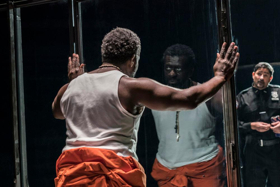Review: JESUS HOPPED THE 'A' TRAIN, Young Vic

![]() Maybe it's the courtroom dramas, maybe it's the brutal plea bargains, maybe it's the sheer scale of it all, but the American criminal justice system always feels like another country, one with rules and norms that appear like ours, but are not ours. It's a big, jungly island with rivers and forests enough to sustain life and the snakes and beasts that come with them, ruled by a malevolent, unseen, unpredictable god whose enforcers reflect that nature.
Maybe it's the courtroom dramas, maybe it's the brutal plea bargains, maybe it's the sheer scale of it all, but the American criminal justice system always feels like another country, one with rules and norms that appear like ours, but are not ours. It's a big, jungly island with rivers and forests enough to sustain life and the snakes and beasts that come with them, ruled by a malevolent, unseen, unpredictable god whose enforcers reflect that nature.
I guess that otherness is a major part of society's problem. To a young man, especially a young black man, America is not the two countries into which it can be lazily divided: red states and blue states; urban and rural; white and non-white. There's the shadow of a third country hanging over the land - the penal state that incarcerates or intervenes in the lives of nearly 7m citizens (2013 figures) making it a larger "nation" than Bulgaria or Libya, the 15th largest state in the Union.
Stephen Adly Guirgis's searing play has lost none of its power in the 19 years since its off-Broadway premiere, indeed its relevance has irrefutably grown, as today even children are caged by guards with guns. It takes us to places we do not want to go, asks us questions we do not want asked and gives us solutions that merely feel like different kinds of problems.
Angel Cruz shot the leader of a religious cult in the ass as a response to the powerlessness he felt at his friend's brainwashing and the authorities' pusillanimous response. He didn't intend to kill, but, after a botched medical intervention, the man dies. Angel is no angel, but he's not diabolical either
In the next cell, Lucius Jenkins has found God and, blessed with the eloquence and charisma of a cult leader himself, talks to Angel through the bars. Jenkins is a serial killer awaiting rendition to Florida and the lethal injection.
Corrections officer, Charlie, likes Lucius and provides him with little treats (there's something of a Barrowclough-Fletcher thing going on, an unlikely comparison, but it's there). Charlie doesn't last long, replaced by Valdez, a mean SOB, who sees himself as the instrument of society's vengeance. Lawyer, Mary Jane Hanrahan, loaded up with Catholic guilt, has a white saviour thing going with Angel - it doesn't end well.
Magda Willi's traverse stage looks like a fencing piste on which the characters lunge and parry, with words as weapons. And what a lot of words there are - a suspension of disbelief is required to accept that everyone is quite so articulate and philosophical, but that's hardly new in prison dramas. The voice of the playwright does get a little too foregrounded at times.
Oberon Ka Adjepong is a force of nature as Lucius - you see why he entrances Angel and Charlie and why Valdez stalks him with a hostility born of fear and envy. Ukweli Roach catches Angel's vulnerability and his journey from tongue-tied kid to spiritual salvation at a frightening cost (whether you believe in that arc or not might depend on your view of religion, an institution that plays a significantly different role in life as lived on different sides of the Atlantic).
Dervla Kirwan spends some time berating us and some time berating Angel, cleverly constructing a lawyer to whom we initially warm, but whose decisions show that the skin she has in the game is as self-serving as the cult leader's fleecing of his flock to fund holidays in Aspen. In Prisonland USA, false prophets come in many guises.
The guards never really step out of their caricature roles, but the whiff of menace clings to Joplin Sibtain's Valdez, a man who, were he in Angel's shoes, would have shot rather higher one suspects.
Director, Kate Hewitt, keeps the pace high, the philosophical debates fizzing with the street argot of NYC even as the Socratic dialogue plays out. Peter Rice's sound adds to the walled-in atmosphere, the subtle mic-ing of the actors' voices giving a faint echo that speaks of space (physical and temporal) that stretches into the distance.
Impressive as it is (a worthy Olivier Award nominee in 2003 for its production at the Donmar), the drama feels so rooted in the transactional nature of American "justice" and in the religious (rather than secular) conception of redemption that full engagement proved difficult to establish and then sustain. Maybe it's too comforting always to believe that this stuff happens to other people - it's easier to be a mini Sherman McCoy before his fall rather than after.
For all that, it's a timely and important revival of a play that looks you in the eye and refuses to blink.
Jesus Hopped The "A" Train continues at the Young Vic until 6 April.
Photo - Johan Persson
Reader Reviews
Videos

